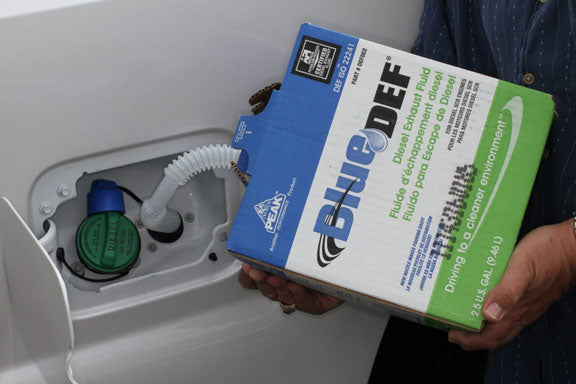June 9, 2020
Proformance Supply
Common Questions & Answers Regarding DEF, Agriculture & Heavy Equipment
Everyone who owns or operates heavy equipment has likely heard of Diesel Exhaust Fluid, or DEF. Yet not everyone is fully aware of what exactly it is, what it does, and how it fits into an existing operation. Fortunately, for every question about DEF, there is an answer.
-
What Is DEF?
Diesel exhaust fluid, commonly referred to as DEF, is a solution of 67.5% deionized water and 32.5% high-purity urea, that’s used to chemically reduce nitrogen oxides emissions (NOx) from non-road mobile machinery and heavy equipment.
Just as important as knowing what DEF is – knowing what it is not:
DEF is not a fuel additive.
DEF is not toxic or harmful to humans or animals.
DEF is not flammable or explosive.
While safe, DEF should still be handled with care to avoid unnecessary spills, contact with eyes, or accidental ingestion.
In the event of a spill on the floor, cover and contain the spill with an absorbent, non-combustible material such as sand. Shovel and dispose of the material in an appropriate container. If DEF is spilled in a sink, on a vehicle, on clothes or gets into the eyes, flush immediately and thoroughly with water.
-
How Does DEF Work?
DEF is used in Final Tier4 diesel engines with Selective Catalytic Reduction (SCR) systems. SCR is an after-treatment technology that treats exhaust gas downstream of the engine, with the goal of reducing levels of NOx emissions that are harmful to the environment and health. DEF is injected into the exhaust stream, prior to the SCR catalyst, and converts NOx into harmless nitrogen and water.
-
Why Does My Equipment Need DEF?
All Final Tier4 engines are equipped with SCR systems. Not only does this technology work with DEF to reduce NOx, the SCR process allows engines to operate at maximum efficiency for better fuel economy and lower costs.
-
How Do I Use DEF?
Although its name may imply otherwise, DEF should never be used in the diesel fuel tank. It should only be used in the appropriate, dedicated DEF tank, which features a smaller opening than a fuel tank and a blue cap, so it is easy to identify.

-
How Much DEF Can I Expect My Equipment to Use?
Every engine varies in its use of DEF. John Deere engines are designed to use less DEF than similar engines; typical DEF use is 1-3% of fuel consumed. So, for every 100 gallons of diesel fuel consumed by a John Deere tractor, approximately 2 gallons of DEF would be needed.
Some engines are designed to burn more DEF; up to 10-12% relative to fuel consumption. Those operating equipment with different engines should research and monitor DEF consumption to accurately assess expected usage.
Additional factors affect DEF usage, one being equipment application. More demanding applications typically require more fuel and DEF.
Although minimal, temperature and humidity also affect DEF consumption. Hot, dry climates use more; cold, humid climates use less.
-
How Often Do I Refill DEF?
One might think because DEF is not consumed at the same rate as fuel, it does not need to be refilled at the same rate. However, vehicle DEF tanks are much smaller than fuel tanks, so they do need regular checks and refills. Refilling DEF is an option using mobile DEF tanks, which are sized appropriately for refills and transfers on a job site or in remote areas.
-
How Do I Store DEF?
Because it is corrosive to aluminum, DEF must be stored in appropriate containers made from durable composite material. Storage containers made from stainless-steel, polypropylene, and high-density polyethylene are appropriate options, and DEF can usually be stored up to one year without issues.
Keep in mind climate when storing DEF. Because it is 2/3 water, DEF begins to turn slushy at 12 degrees Fahrenheit and will freeze solid. The good news is DEF is not harmed by freezing; it can be thawed and used with no side effects. Do not add chemicals or additives to DEF to prevent freezing, as doing so may contaminate and ruin the fluid. On the flip side, direct sunlight is harmful to DEF so it’s best to store indoors or shaded areas.
-
How Do I Know If My DEF Is Old or Contaminated?
The easiest way to spot bad DEF is to look at it. The fluid is naturally clear so if it appears cloudy or colored, it is likely contaminated or old.
If one needs to dispose of bad DEF, do so in an ethical manner. Do not pour DEF down a drain or dump outside. Every area has proper DEF disposal regulations so check with the local government, municipal and environmental agency.
-
How Much Does DEF Cost?
DEF costs about the same per gallon as diesel fuel – but keep in mind, it’s not consumed at the same rate as fuel, so be sure to factor in that usage when planning the expected cost.

-
Where Can I Get DEF?
DEF is available in several places, even some gas stations and retail stores. However, not all DEF is created equal. To get high-quality DEF and the type that is designed for heavy equipment, it is best to purchase from a reputable dealer. And regardless of where DEF is purchased, ensure it is American Petroleum Institute (API) and AdBlue® certified.





Leave a comment